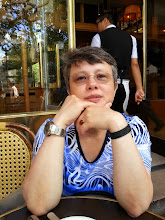"Fallen Angel", by Andrew Taylor, 2007, DVD, ITV Studios Home Entertainment
Fallen Angel (2007) is the story of a female serial killer, by director David Drury, starring Charles Dance, Emilia Fox and Clare Holman. It is based on the "Roth Trilogy" (2006), by Andrew Taylor, and is a chilly psychological drama about the making of a murderer. The movie is divided into three episodes, each representing one part of Rosemary Byfield's life: from nowadays back to her early childhood. As the movie progresses, so unfolds the story of the Byfield family into the Roth parish, each time a decade earlier. Rosemary's father, countryside vicar David Byfield (Charles Dance), is an ambitious clergyman, with a huge appetite for life (especially for women), whose brilliant theological mind costs him no end of trouble. Although the acting is beyond reproach - especially the tandem Dance/Fox, which is fascinating to watch - I found "Fallen Angel" a little disappointing.
Dare I say that, once I saw both the entire movie and the behind-the-scenes bonus, I am still unsure why Rosemary became the terrible person she became. In the interview of writer Andrew Taylor, we are told very interesting things; for instance that Taylor wanted to give his readers, a feeling of mind-digging, a sort of archaeological journey into the sick mind of a female murderer. The trouble is that knowing that does not really help at all to understand why Rosemary kills people. Is it because her grandfather was possibly affected by Alzheimer and fearing confinement, was 'helped' by Rosemary to end his own life? She would have then developed a taste for murder. Taylor seems totally convinced that female serial killers always have a worse behaviour than their male counterparts. Says who? Never mind.
One possible explanation - if there is ever to be one - to Rosemary's fate is that, as a child, she was exposed to misinterpreted religious rites (a key scene in the movie, when Rosemary watched her father serving the Eucharistic wine, and asked "Is it real blood?"), and the bad influence of a revoked lunatic priest, suspected of child abduction, animal tortures and finally murder. But neither Drury, nor the viewer, could say if this alone may have been enough to turn a child into a bloody serial killer. Then, Dury suggests that it might have been Rosemary's indirect exposure to her father's sexual life that made her a murderer. At that point, I must say that, not only is this far-fetched, but it also sounds preposterous, even by that time standards (1990s). Just because one overhears lovemaking noises once in a while, it does not make one a cold-blooded murderer. Especially, as we discover that the vicar's wiwes are less than sex enthusiasts. What then?
Is Rosemary a genuine fallen angel, one that once stood close to God, but later fell because of some terrible deeds or thoughts? Perhaps. Unfortunately, after watching this movie, I am still clueless about the why. On the other hand, Drury is never shy to play with the hows, to the point that Rosemary may very well appear as a catalogue of clinical symptoms, which slowly, but surely produce the disastrous effects that we know. In the first episode, when the Byfield's closest friend, Wendy, meets with Rosemary (she is then five-year-old), the girl told her "My name is nobody, because nobody is perfect". Although, I cannot pretend that this is the very key to unlock Rosemary's killer mind, it might be the best clue – if not the only one - in the entire movie. As if, becoming a serial killer might have something to do with a desperate attempt to achieve some sickened sense of perfection. Far-fetched? Well, nobody is perfect, are they?













No comments:
Post a Comment